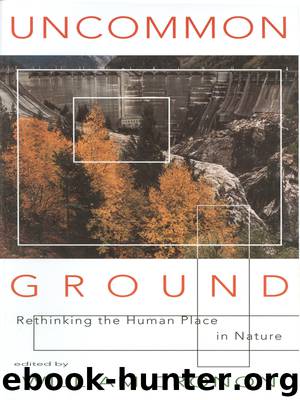Uncommon Ground by William Cronon

Author:William Cronon
Language: eng
Format: epub
Publisher: W. W. Norton & Company
Published: 2013-11-18T16:00:00+00:00
Whose Nature? Whose Ethic?
THE ANCIENT FOREST CAMPAIGN HAS BEEN SUPPORTED BY PEOPLE LIKE JEAN Marie Aurnague, F. J. Petock, Barbara Kelley, and thousands upon thousands of others across the country who consider it their moral duty to protect the Pacific Northwest old-growth forest and its biota. They have joined environmental groups like the Wilderness Society, the Sierra Club, and the Native Forest Council; they have sent letters to their congressional representatives; they have attended hearings, speaking passionately for saving what little remains. Their efforts have resulted in unprecedented policies to restrict logging in mature and old-growth forests of the Pacific Northwest.
And yet this essay has suggested that the ancient forest they strive to protect is as much a reflection of their own particular view of nature as it is some primeval ecosystem under siege by logging. Their ethic, their passionate sense of right and wrong, is only one of many possible ethics. It is enmeshed in a particular, culturally based idea of nature. Viewed from a different perspective—the most notable in the Pacific Northwest being the wise-use ethic of those who support the timber industry—a whole different set of preferred practices and policies emerges.
The ancient forest emerges as a contested moral terrain, a focus of dispute arising from divergent ideas on what nature is and should be, what our role in nature is and should be. The testimonies people made on the proposed spotted owl listing offer clear evidence of this diversity of perspectives on right and wrong. To some people attending that hearing in Eugene, the spotted owl was the proverbial canary in the coal mine, proof that the Pacific Northwest old-growth forest ecosystem was in imminent danger of collapse. To others, the spotted owl was yet another preservationist ploy, a fluffy, big-eyed snail darter whose listing case was deliberately advanced to obstruct sound management of the region’s forest resources.
Yet, in spite of these differences, both sides were apparently deeply concerned about the ways people affect Pacific Northwest forests. Their point of difference was thus not one of whether people should care about nature but of how and why. So there is the Native Forest Council and Barbara Kelley, and there is the Oregon Project and Jim Standard. There is environmentalism, and there are alternative environmentalisms, in the Pacific Northwest. Whose is right? Whose nature ought we to protect? This is the troubling question that arises out of acknowledging that environmental ethics are enmeshed in ideas of nature.
There are several familiar ways out of this dilemma that I find unacceptable. The easiest (or at least most politically popular) solution would be to protect everyone’s nature. And there has been a good deal of interest in finding advanced management techniques that can combine high levels of timber production with environmental protection in the region’s forests. Some of these have gone under the banner of “New Forestry,” defined as “the principle of integrating ecological and environmental values with forest commodities production.”49 Yet, even under optimal assumptions, such techniques entail significant economic
Download
This site does not store any files on its server. We only index and link to content provided by other sites. Please contact the content providers to delete copyright contents if any and email us, we'll remove relevant links or contents immediately.
The Lonely City by Olivia Laing(4120)
Animal Frequency by Melissa Alvarez(3755)
All Creatures Great and Small by James Herriot(3516)
Walking by Henry David Thoreau(3234)
Exit West by Mohsin Hamid(3183)
Origin Story: A Big History of Everything by David Christian(3139)
COSMOS by Carl Sagan(2950)
How to Read Water: Clues and Patterns from Puddles to the Sea (Natural Navigation) by Tristan Gooley(2855)
Hedgerow by John Wright(2776)
The Inner Life of Animals by Peter Wohlleben(2766)
Origin Story by David Christian(2683)
How to Read Nature by Tristan Gooley(2665)
Project Animal Farm: An Accidental Journey into the Secret World of Farming and the Truth About Our Food by Sonia Faruqi(2661)
How to Do Nothing by Jenny Odell(2645)
A Forest Journey by John Perlin(2587)
Water by Ian Miller(2584)
The Plant Messiah by Carlos Magdalena(2453)
A Wilder Time by William E. Glassley(2363)
Forests: A Very Short Introduction by Jaboury Ghazoul(2335)
